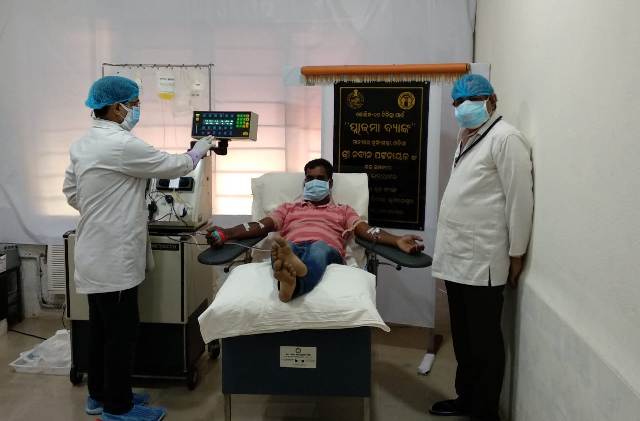Bhubaneswar: Government-run Capital Hospital here has, so far conducted 13 plasma donations till today to help critical COVID-19 patients to recover.
The process, called as “Plasmaphereses” is a term used to refer to a medical procedure through which plasma is separated from blood of a donor, who has recovered from COVID-19 and the plasma can be utilized on a patient suffering from COVID so that the antibodies in the plasma of the donor will help the patient to recover faster.
In fact, in human blood components like white blood cells (WBCs), red blood cells (RBCs) are found and platelets suspended in plasma. While the components of blood are separated in conventional treatment process, separating plasma for the treatment of COVID-19 patients has become a recent technique and it is showing results worldwide.
Currently a donor of plasma (cured COVID-19 patient) can go for self-registration through the portal of the Health and Family Welfare Department. However, after the registration he/she has to pass through several tests and once the tests are done, then he/she can come from donation. In fact, the State Government has accorded a flagship programme status to Plasma Donation across the state.
Plasma banks have been established at SCB Medical College and Hospital, Cuttack, Capital Hospital, Bhubaneswar, MKCG Medical College and Hospital, Berhampur, VSS Medical College, Burla, Ispat General Hospital, Rourkela. There is a plan to start a facility at Sahid Laxman Nayak Medical College and Hospital, Koraput soon.
As per the data available with the website of the Health and Family Welfare Department, one can donate plasma, if one is aged between 18-60 years, weigh above 55 kg, had a prior diagnosis of COVID-19 (as documented by a diagnostic test at the time of illness by RT-PCR from a Government recognized Laboratory) and must have recovered from Covid-19 disease with complete resolution of symptoms and at least one negative laboratory test before 28 days of donation.
On the other hand, one cannot donate plasma, if one is diabetic and under insulin, his/her blood pressure is more than 100-140 mm Hg (systolic) and 60-90 mm Hg (diastolic) with or without medications and the person has uncontrolled diabetics or hypertension with change in medication in last 28 days. Additionally, a cancer survivor, chronic kidney/heart/lungs or liver disease patients and women, who have ever been Pregnant also cannot donate plasma.
Blood Bank Officer at Capital Hospital, Bhubaneswar, Dr Debashis Mishra said at one go a plasma donor can donate 400 ml of plasma and it can be given to two COVID-19 patients.
However, he added that on which COVID-19 patient the plasma is to be administered will depend upon the decision of the clinician as he/she has to assess the condition of the patient. Asymptomatic and patients severely affected by COVID-19 might not be suitable, but Grade-II patients with whom even after administration of oxygen its saturation does not improve marginally, might be appropriate cases. However, he added that the clinician at the COVID hospital has to take a call.
It can be note here that the Blood Bank in Capital Hospital Bhubaneswar has always been the forerunner in implementing blood transfusion and separation related procedures. While in 2001 it started the random donor platelet separation, in 2004 it became the first blood bank in Odisha to start single donor platelet separation.



